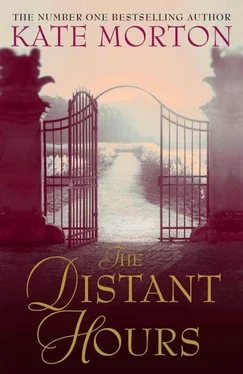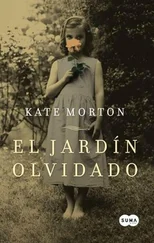She should have cut off her hair years ago. The new style was trim and spare and although she couldn’t claim to look better, it was enough to know that she looked different. With each snip something inside her released, an old idea to which she’d been clinging without knowing it, so that finally, when the young hairdresser lay down the scissors and said, a little greenly, ‘There you are then, dear. Don’t you look neat?’ Percy had ignored the infuriating condescension to agree with some surprise that yes, she did indeed look neat.
Meredith had been waiting for hours, first standing, then sitting, now slouching on the wooden floor of Milderhurst village hall. As time stretched out, and the stream of farmers and local ladies dried completely, and the dark started to hover outside the windows, Meredith let herself wonder what dreadful fate might await her if she weren’t chosen at all, if nobody wanted her. Would she spend the next few weeks living here, alone, in the draughty hall? The very thought made her spectacles mist so that everything was blurred.
And it was then, at that precise moment, that she arrived. Swept in, like a resplendent angel, like something out of a made-up story, and rescued Meredith from the cold, hard floor. As if she knew somehow, through some sort of magic or sixth sense – something science was yet to explain – that she was needed.
Meredith didn’t see the actual entrance, she was too busy cleaning her spectacle lenses on the hem of her skirt but she did feel a crackle in the air and perceived the unnatural silence when it fell amongst the chirruping women.
‘Why, Miss Juniper,’ one of them said, as Meredith fumbled her spectacles back onto her nose and blinked towards the refreshments table. ‘What a surprise. And how may we be of assistance? Are you looking for Miss Blythe, because it’s quite a curious thing, but we haven’t seen her since midday-’
‘I’ve come for my evacuee,’ said the girl who must be Miss Juniper, cutting the woman off with a wave of her hand. ‘Don’t get up. I see her.’
And she started walking, passing the children in the front row, and Meredith blinked a few more times, looked over her shoulder and realized there was no one remaining there, then turned back just in time to find that splendid person standing directly above her. ‘Ready?’ the stranger said. Casually, lightly, as if they were old friends and the whole thing had been planned in advance.
Later, after Percy had lost hours somehow by the brook, sat cross-legged on a smooth-washed stone, built childish boats from whatever came to hand, she returned to the church hall to collect her bicycle. After such a warm day the evening had come in cool, and by the time Percy started for the castle, the falling dusk had shadowed the hills.
Despair had tangled Percy’s thoughts and she tried, as she pedalled, to straighten them. The engagement itself was devastating, but it was the duplicity that cut deepest. All this time – for there must have been a period of courtship leading to the proposal – Harry and Lucy had been sneaking behind her back, conducting their affair beneath her nose as if she were nothing to either of them, neither lover nor employer. The betrayal was like a hot iron to her chest; she wanted to scream, to tear at her own face, and his, and hers, to scratch and harm them both as they had wounded her. To bellow until her voice failed, to be beaten until she no longer felt pain, to close her eyes and never have to open them again.
But she would do none of those things. Percy Blythe did not behave in such a way.
Over the treetops, the oncoming darkness continued to bruise the distant fields and a flock of black birds took flight towards the Channel. The moon’s pale casing, as yet unlit, hung lifeless in the shadows. Percy wondered, idly, whether the bombers would come tonight.
With a short sigh she lifted one hand to press the newly exposed skin at the nape of her neck, then, as the breath of evening brushed her face, she pedalled harder. Harry and Lucy were to be married and nothing Percy did or said would change that fact. Crying would not help, neither would reproach. What was done was done. All that remained was for Percy to formulate and follow a new plan. To do what needed to be done, just as she always had.
When finally she reached the gates of Milderhurst, she swerved across the road and the rickety footbridge, and jumped off her bicycle. Although she’d done little more than sit all day, she was tired, and strangely so. Tired to the ends of her fingers. Her bones, her eyes, her arms, all airy, as if they were made up of grains. Like a rubber band that had been wound too tightly and unravelled now to find itself stretched and frayed, weak and shapeless. She fumbled with her handbag until she found a cigarette.
Percy walked the final mile, pushed the bicycle beside her as she smoked, stopping only when the castle came into view. Barely visible, a black armoury against the navy sky, not a chink of light showed. The curtains were drawn, the shutters were closed, the blackout was being followed to the letter. Good. The last thing she needed was for Hitler to set his sights on her castle.
She rested her bicycle on the ground and lay beside it on the night-cooled grass. Smoked another cigarette. Then another, her last. Percy curled onto her side and pressed her ear to the ground, listened as Daddy had shown her. Her family, her home, was built on a foundation of words, he’d said, time and again; the family tree laced together with sentences in place of limbs. Layers of expressed thought had soaked into the soil of the castle gardens so that poems and plays, prose and political treatises, would always whisper to her when she needed them. Ancestors she would never meet, who had lived and died before her birth, left behind them words, words, words, chattering to one another, to her, from beyond the grave, so she was never lonely, never alone.
After a time Percy stood, picked up her things and continued in silence towards the castle. Dusk had been swallowed by dark and the moon had arrived, the beautiful, traitorous moon, stretching her pale fingers over the landscape. A brave harvest mouse fled across a silver spill of lawn, fine grass quivered on the gentle rises of the fields, and beyond the woods shrugged blackly.
She could hear voices inside as she drew nearer: Saffy’s and Juniper’s, and another, a child’s voice, a girl. Allowing herself a moment’s hesitation, Percy climbed the first step, then the next, remembering the thousands of times she’d run through the door, in a hurry to get to the future, to whatever was coming next, to this moment.
As she stood there, hand poised to open the door of her home, as the tallest trees of Cardarker Wood bore witness, she made a promise: she was Persephone Blythe of Milderhurst Castle. There were other things in life she loved – not many, but there were some: her sisters, her father, and their castle, of course. She was the eldest – if only by a matter of minutes – she was Daddy’s heir, the only one of his children who shared his love for the stones, the soul, the secrets of their home. She would pick herself up and carry on. And she would make it her duty, from this moment forth, to ensure no harm befell any of them, that she did whatever was necessary to keep them all safe.
PART THREE
Kidnappings and Recriminations
1992
Milderhurst Castle was almost lost to the Sisters Blythe in 1952. The castle needed urgent repair, the Blythe family finances were dire, and the National Trust was keen to acquire the property and begin its restoration. It seemed that the sisters had little choice but to move somewhere smaller, sell the estate to strangers, or sign it over to the Trust so they might get on with ‘preserving the crowning glory of the building and gardens’. Only they did none of those things. Percy Blythe opened the castle to visitors instead, sold a few parcels of surrounding farmland, and somehow managed to scrape together sufficient funds to keep the old place standing.
Читать дальше












